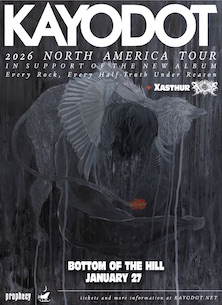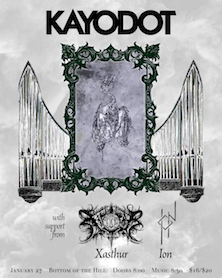




|
 |
 |
 |
 |
 |
 |
 |
 |
|






|
|
Listings are
in the opposite order of appearance: headliner is listed at the top,
next is the support band(s),
and the last band listed is the opener.
|
 |
 |
 |
|
 |
Tuesday January 27
2026  8:00PM doors -- music at 8:30PM ••• 21 AND OVER $16 in advance / $20 at the door Kayo Dot instagram.com/kayodotofficial Avant-garde metal · post-rock Xasthur instagram.com/xasthur_official1 ambient black metal folk Ion instagram.com/ion_sfband Metal Kayo Dot -from New York, NY -Every Rock, Every Half-Truth Under Reason is the new Kayo Dot album, a commemoration of the 20th anniversary of Choirs of the Eye that reunites the original lineup. The latest musical statement from the everchanging composer Toby Driver, it marks both a return and a progression from the band’s seminal debut by revisiting the compositional practices that defined it while pushing forward into uncharted territory. Rejecting traditional rock structures and the more predictable contours of metal, Every Rock… shapes a sound that feels familiar and alien at once, where custom-designed microtonal organs and guitars weave an effort to reconcile the impossible tension between past and future. Moving away from the typical emphasis on low-end frequencies, it floats instead in the upper spectrum, where the textures become more fragile, more intimate, and more abrasive and terrifying. This process of creation revealed a new form of music that the band came to call liminal metal—a sound that inhabits the atmosphere of threshold spaces, where time feels stretched and the boundaries between realities begin to erode. It’s a music of flickering states, caught between what is, what was, and what could have been. In that tension, the album becomes an expression of the hauntological crisis of our times: a cultural and social moment in which the future has grown indistinct, and the present is swollen with the ghosts of a past that will not release its grip. A malfunction in which the past won’t stay buried and the new arrives already pre-formatted by old frameworks. Metal, perhaps more than any other genre, reveals this condition most clearly—trapped in cycles of self-reference, entranced by its own legacy, hungry for newness but tethered to myth. But hauntology is not only about the past. It is also the intrusion of futures that have not yet happened, but whose shadows shape the present. This album is haunted by one such future: the spectre of AI-generated creativity. The increasing presence of artificial composition, predictive modeling, and algorithmic aesthetics casts a long shadow over all creative work today. Toby Driver says: “I felt this shadow pressing on me throughout the writing process. The threat wasn't just technological—it was metaphysical. It became even more important to write in ways that resist prediction, to compose music that does not reveal itself to pattern recognition. Much of the album is an effort to move against the grain of legibility, to make something that slips from the grasp of systems designed to anticipate us. In this way, the music becomes a kind of countermeasure—a way of preserving the unpredictability, opacity, and grief of human creation.” The ghosts in this album don’t just inhabit the lyrics, where first-person voices speak from beyond death—they also permeate the form and texture of the music itself. They live in the dissonances, the silences, the stretched structures, the tones that feel like echoes of something that never quite arrived. The emotional world here isn’t built on conclusion, but on proximity, recurrence, and the strange intimacy of being half-remembered. Across these songs, lingering beneath the surface is a recurring sense that the dead are still needed by the living. That need is not a comfort. It signals a kind of entrapment, a symptom of a cultural condition in which we can’t let go, and can’t quite move forward either. This album doesn’t attempt to resolve that condition. It sits with it, listens, and makes it audible. The new album, Every Rock, Every Half-Truth Under Reason, is OUT NOW! Xasthur -from Alhambra, CA -Some guys have all the luck. XASTHUR founder Scott Conner sure ain't one of them. The always open wound of his life suppurates in a constant flow of sonic blood into and out of his latest album "Disharmonic Variations". The thirteen bitter, painful, dirt-stained, and sometimes even hopeful tracks sure ain't pretty "Goldberg Variations" either. Rather the title "Disharmonic Variations" serves as both the program and the message. Music is not just what Scott does. He does not lead a picture book life. There is only music. Scott does not write and record just 8 songs a year. He makes music 24/7 on his own time and in his own way. Scott does it analogue, in the hard old-fashioned way, with his gear and instruments piled up in the room where he stays at the time. In this musical flow of consciousness, this diary of an artist, all considerations of style are a luxury that Scott does not have. His current form of expression on "Disharmonic Variations" tends towards the acidic taste of American dark folk with one detour into ambient sound. There is no guarantee for the direction that XASTHUR will take next. Whatever happens depends on what Scott feels. XASTHUR were originally conceived by vocalist and multi-instrumentalist Scott Conner in the year 1995. Although started in the sunny state of California, USA, the project started out in the vein of bleak black metal of the Nordic second wave. In 2010, Scott announced the end of XASTHUR and returned with an acoustic dark folk project under the banner of NOCTURNAL POISONING. In 2015, the American artist circled back to the name XASTHUR, but insisted that his black metal days were over. On the previous release "Inevitably Dark" (2023), XASTHUR have partly lifted the self-imposed ban on black metal, simply because Conner felt like it and therefore did it. With "Disharmonic Variations", XASTHUR deliver their next 'take it or leave it' recording. To Scott Conner it does not matter what other people think about his music. Curse him, praise him – he still only does what he wills and that remains his true artistic achievement. Ion -from San Francisco, CA -merging visceral fury and immersive ambience Ryan Daniel - guitars/effects, synthesizers, drums, vocals, lyrics Anthony Pitino - drums, vocals Daniel Perdomo - bass/effects |
 |